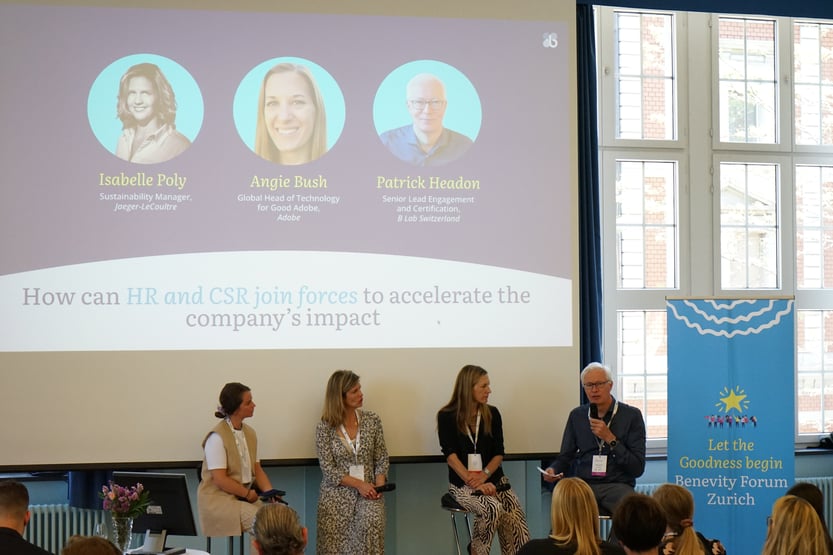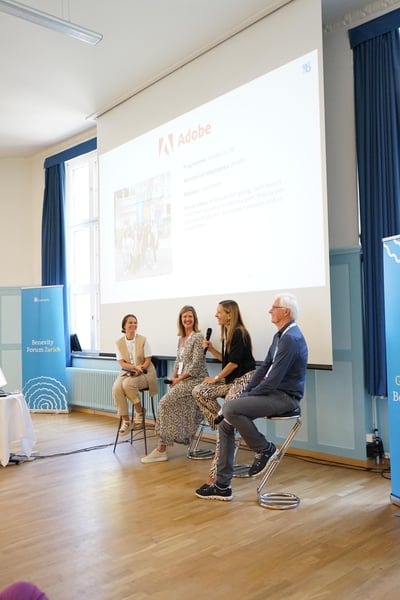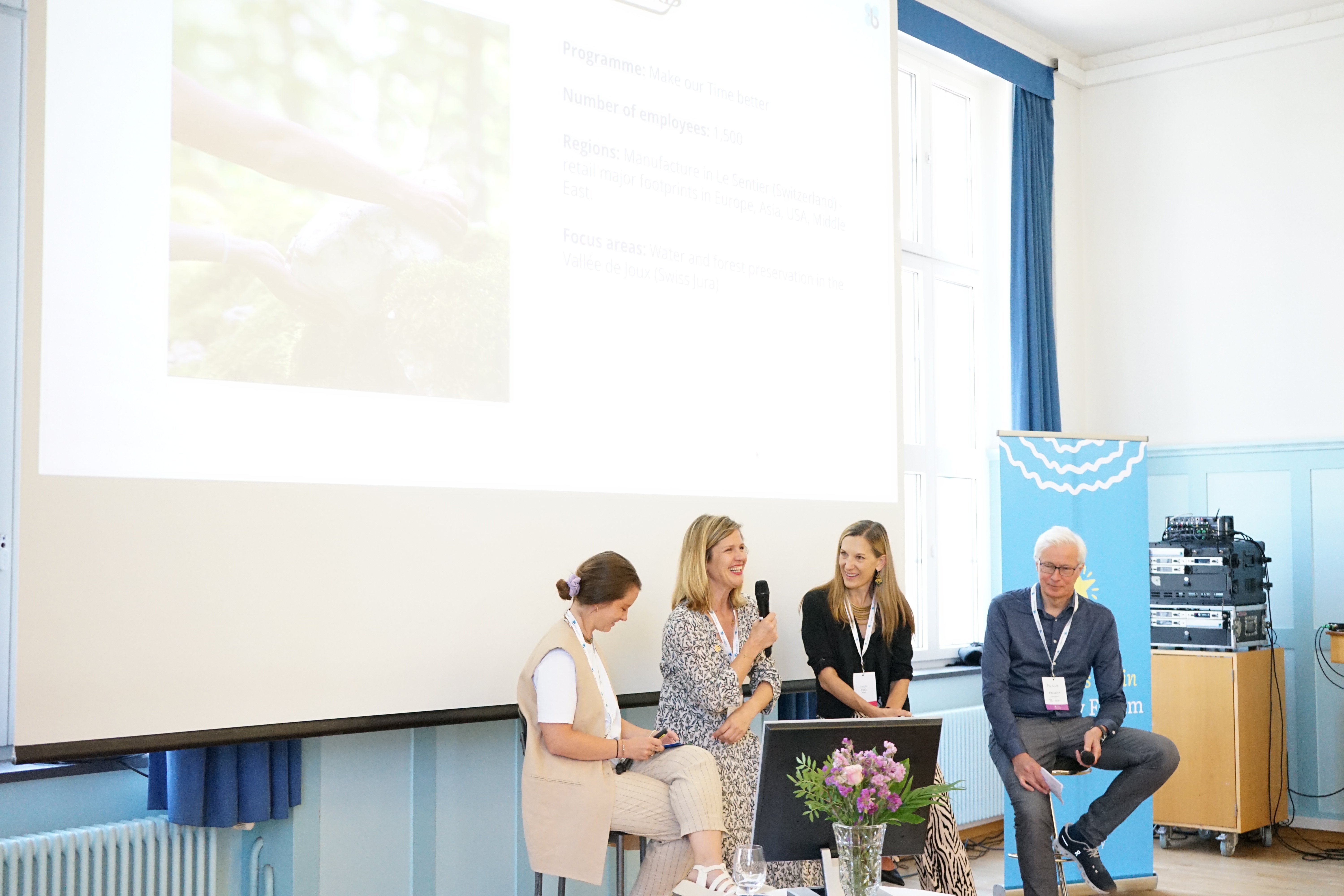The powerful partnership of HR and CSR: Accelerating social and environmental impact

The partnership between Human Resources (HR) and Corporate Social Responsibility (CSR) is becoming increasingly crucial in driving social and environmental impact within organisations. As companies recognise the need to align their purpose with their business strategy, HR and CSR departments are working together to create a more inclusive, equal, and regenerative society.
This article explores a discussion between industry experts Angie Bush, Global Head of Technology for Good at Adobe, Isabelle Poly, Sustainability Manager at Jaeger-LeCoultre and Patrick Headon, Certification Lead at B Lab Switzerland, who shed light on the significance of this collaboration and its positive implications for employee retention and talent attraction.
The growing importance of purpose
Although the panel discussion was about partnerships between CSR and HR, purpose also played an important role. Angie Bush from Adobe emphasised the growing importance of purpose in today's business landscape, and she highlighted how purpose-driven initiatives have been ingrained in Adobe's DNA for the past 40 years, contributing to the company's success and employee satisfaction. Purpose-driven organisations foster diverse and inclusive work environments, which in turn promote innovation, creativity, and employee loyalty.
If you have a more diverse and inclusive employee base and make people feel welcome and empowered, they're going to be more innovative, more creative. They're going to work harder for you and they're going to work harder together. And that's what we really want to enable.
Angie Bush, Global Head of Technology for Good at Adobe
Patrick Headon echoed this sentiment by emphasizing the need for companies to recognise the opportunities inherent in sustainable practices. Rather than viewing sustainability as a risk-minimization strategy, Headon argues that it should be embraced as an avenue for growth, employee engagement, and profitability. A clear purpose that aligns with the company's strategy is crucial, but it must also be effectively implemented throughout the organisation.
Headon stresses the need for whole-organisation alignment, where employees at all levels understand and relate to the company's purpose. Achieving this alignment requires creating a culture that embraces sustainability and encourages employees to contribute to the organisation's purpose. “We all know that if you haven't got a clear purpose that is not embedded in your strategy, it's unlikely to happen.”, Patrick said.
The power of partnerships
To achieve meaningful change and align purpose with organisational goals, HR and CSR departments must work closely together. At Jaeger-LeCoultre, Isabelle Poly works in a rather small team, which makes the partnership with HR even more significant. When they first launched their CSR programme, they had to cancel some activities due to low participation. They soon realised that they didn't reach enough employees because their approach was too much top-down focused, which is where HR came in.

To create a more bottom-up focused movement, they started to involve the HR team to reach as many employees as possible through initiatives like the onboarding process or the communication of ongoing activities. And this change paid off. Since then, they haven’t had issues with low participation. Another advantage of the partnership between HR and CSR is that HR teams are usually more local than CSR teams.
I also see a complementary function between HR and CSR. CSR typically leads the programme from an international point of view, where HR can be there locally to help deliver the actions with local enablers.
Isabelle Poly, Sustainability Manager at Jaeger-LeCoultre
Angie cites the partnership between HR and CSR at Adobe as instrumental in the success of their programmes. By leveraging the diversity and inclusion initiatives within HR, they have been able to create a robust and cohesive programme called "Adobe For All." This programme aims to empower employees, promote social impact, and advance diversity and inclusion goals. The partnership between HR and CSR helps ensure that purpose is deeply embedded in the organisation's strategy and culture.
Patrick Headon emphasises not only the role of a partnership with HR, but also partnerships with external collaborations in amplifying impact. Engaging with organisations like B Lab, which certifies B Corporations committed to meeting rigorous social and environmental standards, allows companies to access resources, best practices, and a community of like-minded organisations. Collaborations with nonprofits, NGOs, and government entities further enhance a company's ability to create sustainable change and make a positive impact.
Impact on employee retention and talent attraction
All three panelists acknowledged the increasing significance of CSR initiatives in attracting and retaining talent. According to a recent survey mentioned by Angie, 93% of Gen Z individuals stated that they would actively support companies with sustainability programmes. Candidates are increasingly seeking organisations that demonstrate a commitment to social and environmental causes. Patrick also shared an anecdote about a candidate who placed high importance on a company's sustainability initiatives during an interview, showcasing the growing influence of CSR on employee decisions.

The collaboration between HR and CSR plays a vital role in addressing these expectations and concerns. HR departments are responsible for creating a diverse, inclusive, and purpose-driven work environment that aligns with the organisation's social impact goals. By partnering with CSR, HR professionals can ensure that sustainability initiatives are integrated into the employee experience, from recruitment to retention. This collaboration includes embedding purpose in the company's strategy, fostering inclusive cultures, and aligning decision-making processes with sustainability goals.
“I'm sure every CSR manager agrees that a more engaged and empowered workforce is a workforce that's going to stick with you. They're going to work for you, they're going to appreciate you, they're going to refer their friends, and they're going to ultimately stay longer and be more successful.”, Angie said.
The positive impact of such collaboration is evident in employee engagement and retention. Employees who feel connected to the company's purpose and have opportunities to contribute to social and environmental causes are more likely to be engaged and committed. They become advocates for the organisation and refer potential candidates who share similar values. Moreover, companies with robust CSR programmes and a strong sense of purpose tend to attract top talent, particularly from the younger generations, who are increasingly motivated to work for companies making a positive impact.
The role of technology in enabling companies to create a positive social impact
As we have seen, the partnership between HR and CSR is significant in order to involve people in CSR initiatives. But Isabelle also mentioned the fundamental advantage of using technology to create a greater social impact. Using a CSR platform helps companies to adapt to different profiles in a company and to reach people who don't have a work email address. That is especially helpful for Jaeger-LeCoultre, as their workforce is split between office workers, who have access to computers at work, and retail employees who don't.
Isabelle also mentioned that a CSR platform plays a crucial role when it comes to key performance indicators (KPIs). Using technology to support your CSR programmes gives you access to easy reporting tools, which not only makes it easier to prove the success of the programme to the stakeholders, it also helps prove to employees that their engagement actually has a positive impact.

In conclusion, the partnership between HR and CSR departments is becoming increasingly important for organisations aiming to create social and environmental impact. By aligning purpose with business strategy, fostering inclusive cultures, and engaging employees in meaningful initiatives, companies can attract and retain talent, especially from socially conscious generations who now make up the majority of the workforce. As employee expectations evolve even further, HR and CSR collaboration will continue to play a vital role in driving social and environmental progress while positively impacting the bottom line.
Keeping a pulse on future CSR and ESG trends
At our Benevity Forum in Zurich, we saw once again how important it is to exchange views on new trends in CSR and ESG and how helpful the conversation with other companies can be. To keep track of the latest trends and developments, you can always take a look at our resources, where we share exciting articles, guides and e-books on the topics of CSR and ESG for you.
